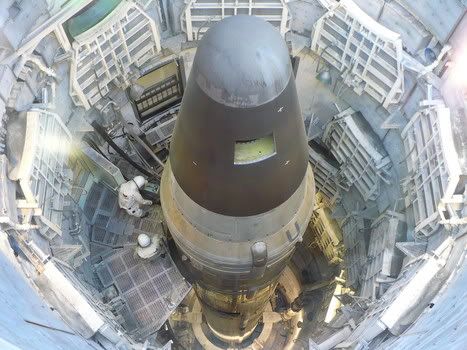MOOOOOOOOOOOOOOOOOSE!
I was just checking the stats on my little blog spot and noticed the most viewed entry is coming up on its’ one year anniversary. This entry has fascinated me because of its’ popularity. It has had months where it has had 100’s of hits from Iran. It has had months where there were the same number of hits from Russia, and it’s strange how country specific it is. This month the people of Denmark are interested. I get the impression the blog is rolling around intelligence agencies.
Anyhow I wanted a bit of an open thread too so I could show this.
That’s a previously unknown comet smacking the sun on October 3rd.
So let’s get on with the story eh?
The power to destroy humanity on this planet carries a great deal of responsibility. One of the bedrock trusts the rest of us have to have in order to sleep well at night is that the security and reliability of our nuclear forces has to be 100%.
So when I got wind of this story I almost couldn’t believe it.
WASHINGTON – An equipment failure disrupted communication between 50 nuclear missiles and the launch control center at Warren Air Force Base in Wyoming over the weekend, an Air Force spokesman said Tuesday.Lt. Col. Todd Vician said the break occurred early Saturday and lasted less than one hour. The White House was briefed about the failure Tuesday morning
The Air Force assures us that the security of the missiles was never in danger and that the ability for them to launch was never lost, and these are not the droids you seek. I’m sorry that last part was a bit of cynicism.
The equipment failure disrupted “communication between the control center and the missiles, but during that time they were still able to monitor the security of the affected missiles,” Vician said. “The missiles were always protected. We have multiple redundancies and security features, and control features.”
According to the official, engineers believe that a launch control center computer (LCC), responsible for a package of at least five missiles, usually ten of them, began to “ping” out of sequence, resulting in a surge of “noise” through the system. The LCCs interrogate each missile in sequence, so if they begin to send signals out when they’re not supposed to, receivers on the missiles themselves will notice this and send out error codes
The Atlantic’s account of this story
Do these statements make anyone else’s anus pucker? They could monitor security? Let’s say that this was a cyber warfare attack could they monitor the missiles being launched by say some Al Qaeda computer whiz? They began to “ping” out of sequence? So are they trying to tell us our nuclear forces have a software issue or a mind of their own?
The firepower they lost contact with has the ability to ruin life on earth for all of humanity, and they lost contact with it they started pinging on their own. I’m sorry that simply cannot be allowed. If there aren’t generals in civilian clothes over this we don’t have the responsibility requisite to be a nuclear power.
An administration official said that “to make too much out of this would be to sensationalize it. It’s not that big of a deal. Everything worked as planned.”
The Atlantic’s account of this story
For the first time in my history I’m going to straight criticize the Obama Administration. Whoever said that everything worked as planned and to not make a big deal out of it needs to lose their job as well as every Air Force officer above the rank of Major with any responsibility for this incident.
Update 8:00 am
“Over the course of 300 alerts – those are 24-hour shifts in the capsule – I saw this happen to three or four missiles, maybe,” says John Noonan, a former U.S. Air Force missile launch officer who first tweeted word of the issue. “This is 50 ICBMs dropping off at once. I never heard of anything like it.”“There are plans and procedures available to deal with individual broken missiles,” Noonan adds, “but they are wholly inadequate to handle an entire squadron of missiles dropping offline.”
So the Air Force mentioned that security was not impacted by the event, and the administration said it wasn’t a big deal
According to people briefed on what happened, a squadron of ICBMs suddenly dropped down into what’s known as ‘LF Down’ status, meaning that the missileers in their bunkers could no longer communicate with the missiles themselves. LF Down status also means that various security protocols built into the missile delivery system, like intrusion alarms and warhead separation alarms, were offline.
Intrusion alarms, and separation alarm were offline and that’s not a big deal? Seriously?
Seems to me I wrote a few weeks back about a group of Air Force officers that had something to say about missiles dropping off line. The world is a funny place.
One year later this story has gone down the memory hole, Still makes me scream WTF.
Namaste friends.

8 comments